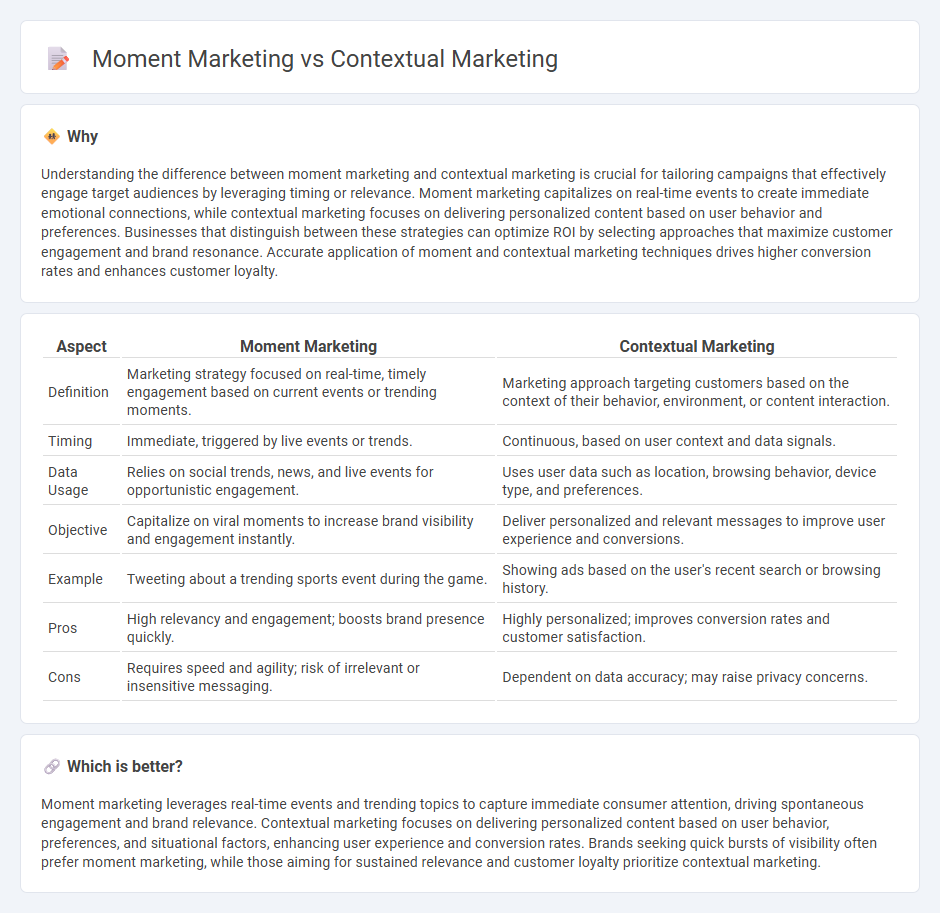
Moment marketing focuses on engaging consumers during specific real-time events or trending moments to create immediate relevance, while contextual marketing delivers tailored content based on the user's current environment, preferences, or behavior. Both strategies aim to enhance customer experience by aligning messaging with timely or personalized factors, improving conversion rates and brand loyalty. Explore more insights on how these dynamic marketing approaches can transform your campaigns.
Why it is important
Understanding the difference between moment marketing and contextual marketing is crucial for tailoring campaigns that effectively engage target audiences by leveraging timing or relevance. Moment marketing capitalizes on real-time events to create immediate emotional connections, while contextual marketing focuses on delivering personalized content based on user behavior and preferences. Businesses that distinguish between these strategies can optimize ROI by selecting approaches that maximize customer engagement and brand resonance. Accurate application of moment and contextual marketing techniques drives higher conversion rates and enhances customer loyalty.
Comparison Table
| Aspect | Moment Marketing | Contextual Marketing |
|---|---|---|
| Definition | Marketing strategy focused on real-time, timely engagement based on current events or trending moments. | Marketing approach targeting customers based on the context of their behavior, environment, or content interaction. |
| Timing | Immediate, triggered by live events or trends. | Continuous, based on user context and data signals. |
| Data Usage | Relies on social trends, news, and live events for opportunistic engagement. | Uses user data such as location, browsing behavior, device type, and preferences. |
| Objective | Capitalize on viral moments to increase brand visibility and engagement instantly. | Deliver personalized and relevant messages to improve user experience and conversions. |
| Example | Tweeting about a trending sports event during the game. | Showing ads based on the user's recent search or browsing history. |
| Pros | High relevancy and engagement; boosts brand presence quickly. | Highly personalized; improves conversion rates and customer satisfaction. |
| Cons | Requires speed and agility; risk of irrelevant or insensitive messaging. | Dependent on data accuracy; may raise privacy concerns. |
Which is better?
Moment marketing leverages real-time events and trending topics to capture immediate consumer attention, driving spontaneous engagement and brand relevance. Contextual marketing focuses on delivering personalized content based on user behavior, preferences, and situational factors, enhancing user experience and conversion rates. Brands seeking quick bursts of visibility often prefer moment marketing, while those aiming for sustained relevance and customer loyalty prioritize contextual marketing.
Connection
Moment marketing and contextual marketing are connected through their focus on delivering highly relevant content based on real-time consumer behavior and situational triggers. Both strategies leverage data such as location, time, and current events to tailor messages that resonate with the audience's immediate needs and interests. This integration enhances engagement by providing personalized experiences that drive timely interactions and conversions.
Key Terms
**Contextual Marketing:**
Contextual marketing leverages real-time data such as user location, browsing behavior, and device type to deliver personalized advertisements tailored to the specific context of the consumer. This strategy increases engagement rates by ensuring content relevance and enhancing user experience through targeted messaging aligned with current interests and needs. Discover more about how contextual marketing transforms customer interactions and drives higher conversion rates.
Personalization
Contextual marketing leverages real-time data such as location, device type, and browsing behavior to deliver highly personalized content tailored to the user's current environment. Moment marketing zeroes in on specific events or trending topics to create timely, relevant messages that resonate with consumers' immediate interests or emotions. Explore deeper insights into how personalization drives engagement in both strategies.
Real-time Data
Contextual marketing leverages user-specific data such as location, browsing history, and preferences to deliver personalized content, enhancing relevance and engagement. Moment marketing, on the other hand, capitalizes on real-time data triggered by current events or trending topics to create timely, attention-grabbing campaigns. Explore deeper insights into optimizing your marketing strategy with real-time data.
Source and External Links
Contextual Marketing: What It Is + How It Works with Examples - Contextual marketing is an advertising approach that tailors ads to fit the environment and circumstances where users are most likely to engage and convert, focusing on relevance and timing to enhance effectiveness.
What is contextual marketing and how does it work? - Contextual marketing is an online strategy where targeted ads are delivered to users based on their search terms or recent browsing behavior, aiming to reduce annoyance and increase engagement by aligning ads with user interests.
What is Contextual Marketing? Definition & Examples - Contextual marketing reaches specific audiences with relevant content at the right time, using examples like health ads triggered by stock market drops or product recommendations based on recent browsing activity.
 dowidth.com
dowidth.com